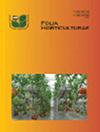Evaluation of alternative substrates for hydroponics based on biological parameters of leaf lettuce (Lactuca sativa L.) and its stress response
IF 2.2
4区 农林科学
Q2 HORTICULTURE
引用次数: 0
Abstract
ABSTRACT The study focusses on alternative substrates with the potential to replace common substrates, such as mineral wool and perlite, as the influence of these on ecosystems and resources is being debated. To this aim, wood fibre, sheep wool and coco peat substrates were selected for testing. Leaf lettuce (Lactuca sativa L. ‘Lisboa’) is taken as the model crop for the evaluation of alternative substrates. The closed hydroponic system ebb and flow with growing in pots was used for the experiment. The parameters of the nutrient solution were EC 1.5–2 mS and pH 6–7. Biological parameters, content of nitrates, plant stress indicators, antioxidant activity (AA) as % scavenging of DPPH (AA), glutathione (GSH), ascorbate peroxidase (APX), total phenol content (TPC) and the content of chosen elements in the drain from substrates were evaluated. According to the biomass production of lettuce, the substrates can be ranked from the lowest as follows: sheep wool < wood fibre < mineral wool < perlite < coco peat. The levels of GSH and APX did not affect AA. The TPC showed the greatest effect on AA and the stress response in general. The nitrate content ranged between 426 and 686 mg · kg–1 of fresh mass. Instead of mineral wool and perlite, coco fibre could be a promising alternative organic substrate for lettuce production in the ebb and flow hydroponics system. Wood fibre and sheep wool still have unresolved circumstances regarding their physical and chemical parameters.基于叶莴苣生物学参数及其应激反应的水培替代基质评价
本研究的重点是有可能取代普通基质的替代基质,如矿棉和珍珠岩,因为它们对生态系统和资源的影响正在讨论中。为此,选择了木材纤维、羊毛和椰子泥炭作为试验基质。以叶莴苣(Lactuca sativa L. ' Lisboa ')为模型作物,对其替代基质进行评价。试验采用封闭的水培系统,即盆中生长的潮起潮落系统。营养液的参数为EC 1.5 ~ 2 mS, pH 6 ~ 7。研究了生物参数、硝酸盐含量、植物胁迫指标、抗氧化活性(AA)、DPPH (AA)、谷胱甘肽(GSH)、抗坏血酸过氧化物酶(APX)、总酚含量(TPC)和底物中选定元素的含量。根据生菜的生物量产量,底物可由低至低排列为:羊毛<木纤维<矿棉<珍珠岩<椰子泥炭。GSH和APX水平不影响AA。总的来说,TPC对AA和应激反应的影响最大。硝酸盐含量在426 ~ 686 mg·kg-1(新鲜质量)之间。可可纤维可以代替矿棉和珍珠岩,在潮汐水培系统中作为生菜生产的有机基质。木纤维和羊毛的物理和化学参数仍有未解决的情况。
本文章由计算机程序翻译,如有差异,请以英文原文为准。
求助全文
约1分钟内获得全文
求助全文
来源期刊

Folia Horticulturae
Agricultural and Biological Sciences-Horticulture
CiteScore
3.40
自引率
0.00%
发文量
13
审稿时长
16 weeks
期刊介绍:
Folia Horticulturae is an international, scientific journal published in English. It covers a broad research spectrum of aspects related to horticultural science that are of interest to a wide scientific community and have an impact on progress in both basic and applied research carried out with the use of horticultural crops and their products. The journal’s aim is to disseminate recent findings and serve as a forum for presenting views as well as for discussing important problems and prospects of modern horticulture, particularly in relation to sustainable production of high yield and quality of horticultural products, including their impact on human health.
 求助内容:
求助内容: 应助结果提醒方式:
应助结果提醒方式:


